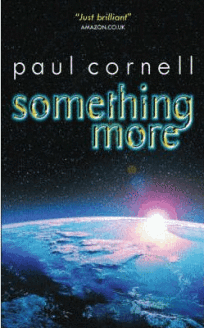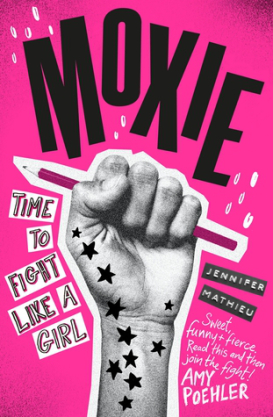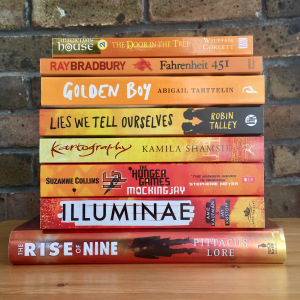This review of Something More by Paul Cornell was written in 2001 for the website Infinity Plus.
Gollancz, 2001, £10.99, 422pp, ISBN 0-575-07203-2
 A crazy sf ghost story set (mostly) in 2248, Something More is nothing if not, um, a crazy sf ghost story.
A crazy sf ghost story set (mostly) in 2248, Something More is nothing if not, um, a crazy sf ghost story.
It is 200 years after the General Economic Collapse (‘GEC’), which has seen England revert to a less than ideal pastoral state ruled by ruthless, violent ‘houses’, all of which are permanently scrabbling for territory.
In the midst of all this unpleasantness sits Heartsease, a stately home that, despite being uninhabited for most (but not all) of the GEC’s chaotic aftermath, is clean, well-tended and in perfect working order.
The Reverend Jane Bruce is a chaplain of the Reformed Church of England – reformed in the sense that shortly before the GEC a rogue vicar discovered that electromagnetic fields directly stimulate a certain area of the brain, one of which at least is partly responsible for religious visions and sensations; so the RCoE uses voltmeters and evocative neurochemicals called ‘greens’ in its daily rituals.
OK so far?
With a small contingent of soldiers as her escort across the dangerous countryside, Jane visits Heartsease to ‘survey’ it with the hope of opening the house up for habitation.
Booth Hawtrey is over 250 years old, made immortal in his service of aliens. He is also on his way to Heartsease on one of the typically mundane missions his distant masters sometimes ask him to undertake. With him is his biographer, Rebecca, the traumatised ex-girlfriend of the unpleasant leader of another group of soldiers – the sworn, and not-too-distant, enemies of those escorting the Reverend Jane.
The first half of Something More is genuinely scary in places; Cornell’s writing feels loaded with uncertainty at the best of times, and his evocation of that spooky feeling you get when you might have heard something outside your bedroom door in the middle of the night raised all the hairs on the back of my neck during the day on a number 12 bus in the middle of London!
If this were a film I can imagine it being terrifying.
But Cornell has much bigger plans than simply scaring us, because then Something More turns (as the title of chapter 44 says) into ‘A Mad Sort of C.S. Lewis Thing’. There isn’t much more that can be said about the final quarter of the book without spoiling much of the first three-quarters.
I will note that the ‘Mad C.S. Lewis Thing’ towards the end left me thinking that Cornell had spent far too many pages on the earlier sections that are, ultimately, largely irrelevant.
The intriguing, but under-utilised, character twist involving Jane and Rebecca near the end is not predictable from earlier events (I think) and therefore loses much of its power – after a plot twist we should be able to look back on events and kick ourselves for not making a connection sooner. That’s far more satisfying than a plot twist that comes almost completely from nowhere, and I had no idea where Something More was heading at all, and I challenge anyone who reads this book to say, hand on heart, that they saw it all coming from miles off.
Cornell doesn’t write sympathetic characters: there is no hero in Something More, and his world is not a happy one, but then his post-GEC England isn’t the apocalyptic landscape you might expect and is perhaps darker because of that – England is still a green and pleasant land; it is only the people inhabiting this landscape that make things otherwise.
Booth Hawtrey’s alien immortality, messages, received via radio telescope from his sponsors, and the hi-tech religion of the Reformed Church of England, all sit oddly in an almost medieval world where helicopters are a lost technology; however (and I don’t think I’m giving too much away by saying this) the book’s ending suggests that this lack of consistency may simply be symptomatic of a greater problem.
The inconsistency does not matter because, ultimately, nothing matters.
Um, I sense I’m becoming a bit too cryptic here so perhaps it’s time to conclude. Something More isn’t perfect; it’s at times self-indulgent (not always necessarily a bad thing) and meandering, but it is, at least, never trite, and it can be unflinchingly honest in its portrayal of human insecurities and fears.
It’s rather ‘baggy’, in that I didn’t really get a true sense of what this 23rd century Britain was genuinely like: a kind of medieval place with mobile phones, airships and automatic weapons.
I enjoyed Something More a lot in places; there are plenty of interesting ideas and a lot of thought in here, but with hindsight it seems a somewhat unsatisfying, over-egged, pudding. But give it a go – Paul Cornell writes very well indeed and deserves praise for trying something just that little bit more challenging and off-kilter.
Advertisements Share this:





